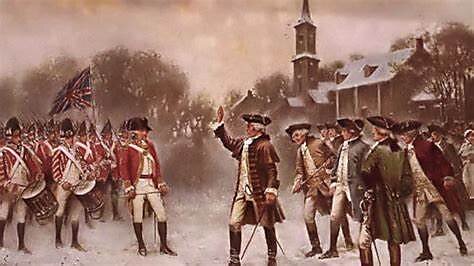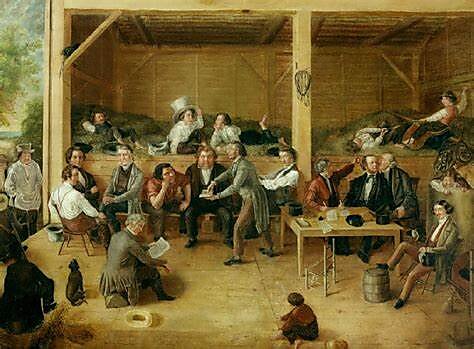Two hundred and fifty years ago, the boom of muskets at Lexington and Concord ignited a revolution. The “shot heard round the world” led to the founding law of a new nation: a Constitution that enshrined liberty, due process, self-governance, and a profound suspicion of unchecked power. As we commemorate this pivotal anniversary, we must not forget how the Framers’ revolutionary ideals transformed American law.
The American colonists had grown more and more frustrated with British subjugation. They were oppressed by unjust laws imposed by a distant Parliament devoid of colonial representation. Their rights as Englishmen were infringed upon by the perfunctory adjudication of alleged violations in admiralty courts. Those admiralty courts lacked juries, and the colonists understood the absence of juries as eliminating a crucial safeguard against tyranny. The Framers recognized that trial by jury was a cornerstone of basic fairness and self-governance; furthermore, the jury itself served as a vital check on potential abuses of power.
The Framers envisioned the jury as far more than a fact-finding body. They viewed the jury as a critical bulwark against government oppression. They had seen biased verdicts from judges beholden to the Crown, and so they enshrined the right to trial by a jury of one’s peers in the Constitution. That is why Article III of the Constitution requires “all” federal crimes to be tried by jury; that is why the Sixth Amendment guarantees a public trial by an impartial jury in “all criminal prosecutions.”
In short, the Framers understood jury trials as a bedrock of criminal adjudication. Today, however, that understanding has been supplanted by our modern system of assembly-line, often highly coercive plea bargaining. This shift stems from the many tools that prosecutors now use to leverage guilty pleas, as well as the disengagement of judges who are fundamentally unwilling to police the modern plea-bargain system. This shift reveals the transformation and collapse of the criminal jury’s historic role.
In the Founding era, the function of the criminal jury trial was not confined to the determination of guilt. Instead, jury service empowered ordinary citizens to check the wrongful exercise of state power. The jury prevented the arbitrary or oppressive application of law. It served as the community’s voice in criminal trials; in that context, it ensured that the extraordinary power of the state would not be used for tyrannical ends.
Today, criminal jurors are told that they are merely fact-finders; this diminution marks an extraordinary change from past practice. Founding-era jurors had a larger mission: they were charged to assess the wisdom, fairness, and legitimacy of each prosecution. Those jurors were even allowed to acquit factually guilty defendants to prevent injustice—if they determined that a law had been immorally applied or that a sentence was disproportionate to the wrongfulness of the crime.
To understand Founding-era juries, we must understand the Founding. The Framers had just emerged from a war against a tyrannical monarchy that employed arbitrary arrests, unfair trials, and cruel punishments; that experience shaped the Bill of Rights. Consider the Fourth Amendment’s protection against unreasonable searches and seizures; the Fifth Amendment’s guarantees of due process, including the presumption of innocence and protection against self-incrimination; the Sixth Amendment’s rights to counsel, to the confrontation of witnesses, and to a speedy, public, and impartial trial by jury; and the Eighth Amendment’s prohibitions on excessive bail and cruel and unusual punishment. Those Amendments are direct responses to the injustices the Framers witnessed and swore to end.
The Framers understood the critical role that citizen-jurors played: those jurors are a shield against persecution. Four decades before the first shot of the Revolutionary War was fired, dissident publisher John Peter Zenger was charged with seditious libel for criticizing New York’s royal governor. A New York jury acquitted Zenger, and that acquittal became a celebrated example of what we now call jury nullification.
Jury nullification has deep footprints in American legal history. In 1851, just a few miles from Lexington and Concord, a mob gathered at a Boston courthouse to prevent the return of a former slave, Shadrach Minkins, to captivity. Members of the mob were prosecuted, but jurors refused to convict. Whether protecting dissident publishers like Zenger from politically motivated prosecutions or acquitting abolitionists prosecuted for blocking the return of former slaves to bondage, juries recognized that it was part of their job to do the right thing. When jurors were faced with the spectacle of criminal defendants who were victims of an excessively punitive government, they delivered acquittals in spite of the evidence, before, during, and after the Founding.
Citizen juries that understand their proper constitutional role provide vital protections to modern American society. The value of such protections should be especially evident in 2025. The authoritarian tendencies of the chief executive of the United States are now regularly revealed by his disavowals of due process, his attempts to silence the opposition, and his orders to investigate those who resisted his evidence-free claim that the 2020 election was stolen.
As we mark the 250th anniversary of the American Revolution, we hear alarming echoes of the tyranny the Framers fought against. The role of criminal juries as a bulwark against tyranny—and as protector of their communities—deserves a moment of contemplation. The Framers’ emphasis on the jury as a safeguard against injustice remains essential to our civic life. Their values must continue to illuminate our understanding of due process and our pursuit, through the jury system, of justice.




